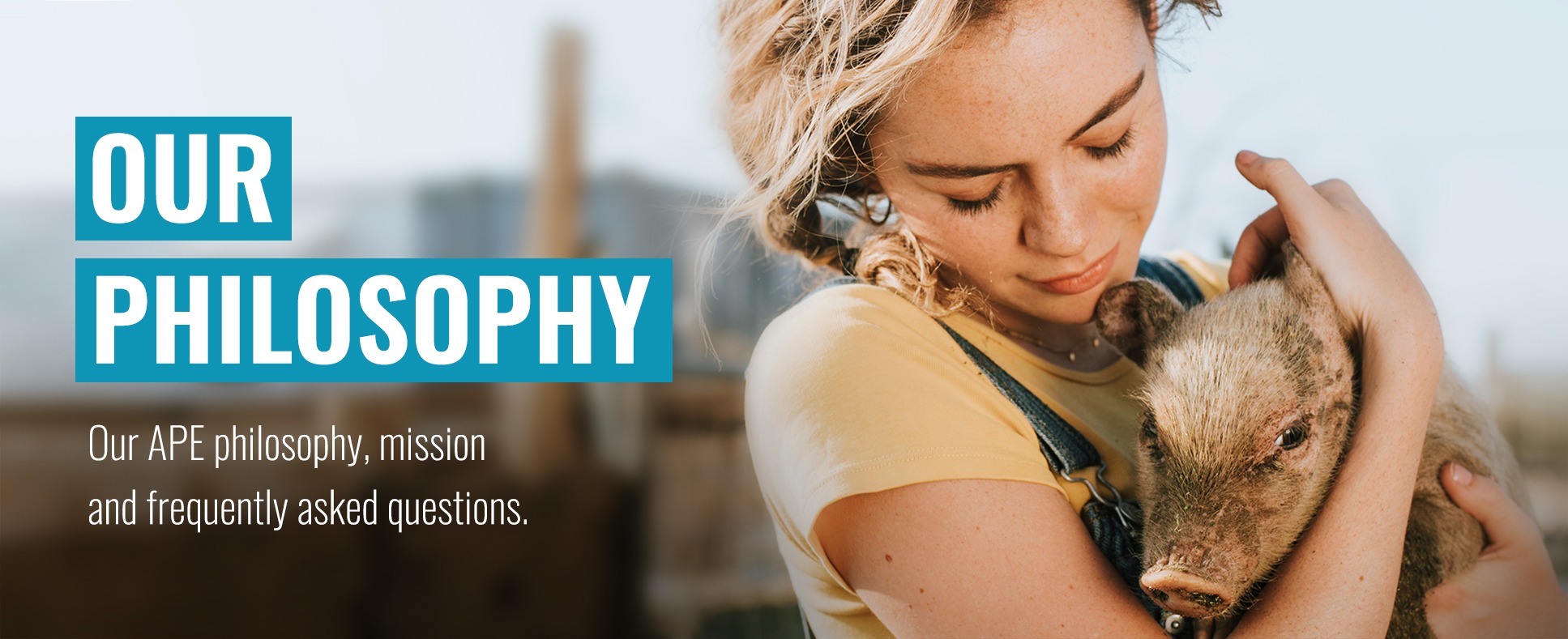Education Philosophy
Voiceless’s Animal Protection Education (APE) resources invite students to think critically about important animal protection and sustainability issues.
Our APEs make it as easy as possible for teachers to introduce this crucial content into the classroom.
APEs include curriculum-aligned teaching and learning programs, providing students with the knowledge they need to consider, analyse and debate differing perspectives on thought-provoking and relevant animal protection topics, as well as the tools to question for themselves what it means to act with kindness, respect, integrity, and compassion in our ever-changing world.
This pedagogical approach follows the inquiry learning model, which encourages students to think critically about the various scientific, ethical, political, and environmental questions that arise from the issues explored.
We have embedded the Australian Curriculum’s General Capabilities into our sequence of learning, with a focus on Personal and Social Capability and Ethical Understanding. All units of work are linked to the cross-curricular priority of Sustainability, which promotes positive change and encourages action.
Voiceless enables learners to reflect on their personal citizenship, actions and responsibilities within our world, helping them on their path to making informed ethical judgements and preparing them for a life outside the classroom. We recognise that today’s youth are tomorrow’s change-makers. Access our APE resources here.
Frequently Asked Questions
Why did Voiceless develop the APE program?
The Voiceless APE program (2017-2021) was established to address the fact that there is a distinct lack of formal youth education exploring animal protection issues in Australia. Voiceless believes secondary school students should have the opportunity to research, discuss and debate a wide range of animal protection issues and concepts.
APE resources enable high school educators to bring key animal protection issues into the classroom in an age-appropriate and professional manner so that students can engage with the factual information they need to question, consider and discuss new concepts and issues.
Why do Voiceless APE resources encourage ‘critical thinking’?
Should we ban live export? Are fishes sentient? What are the welfare issues raised by dolphin captivity? Why are animals classified as human property under the law? We let the students answer. Voiceless APE resources encourage students to use their critical thinking skills to discuss and debate topical animal protection issues and concepts. By providing teachers and students with the information they need to question, consider and discuss the issues for themselves, we are helping to raise awareness and understanding amongst the next generation of changemakers.
How were Voiceless APE materials developed?
All APEs were created by the Voiceless education team, consisting of high school and tertiary educators with decades of teaching experience between them. APEs include a diverse range of perspectives, ensure all statements are verified and supported by thorough scientific, legal and policy research. In the making of APEs, Voiceless collaborated with subject matter experts, including scientists, lawyers, teachers, advocates and academics as well as incorporated feedback from a wide range of educators.
What do teachers say about APE resources?
Teacher responses have been overwhelmingly positive.
- ‘The approach adopted so far is spot on. The breadth and range of options is fabulous. You could pick up these materials and run them very easily as a teacher. I was struck at how well organised and professional it all is.’ (Simon, High School Teacher, VIC).
- ‘The materials were all really well presented, Voiceless have done a great job!’ (Amy, High School Teacher, NSW)
- ‘It’s extremely professional looking and I’m excited to use it myself. I’ve looked for material like this before and not found a great deal that was helpful or relevant.’ (Madeline, High School Teacher, TAS)
- ‘These materials are filling a need, and it’s very important. All of the material is thoughtfully created and structured.’ (Alex, High School Teacher, NSW)
- ‘It is about making well-rounded citizens who move out into the world and have the ability to think critically and make responsible decisions.’ (Sharyn, Drama, LOTE and English Teacher, NSW)
Are you still running the Animal Protection Education program?
From January 2022, Voiceless will no longer be running the Animal Protection Education program. We are transitioning into strategic grantmaking and our resources will be focused on making the Voiceless Grants Program as impactful as possible. Please see our Grants FAQ for more information.
We encourage teachers and students to use our website as a library of resources – the site includes information on animal law, ethics, animal sentience, science and much more. All Voiceless information is thoroughly fact-checked, referenced and verified by scientific and legal experts.
Further questions?
Please don’t hesitate to contact us by email: info@voiceless.org.au.

